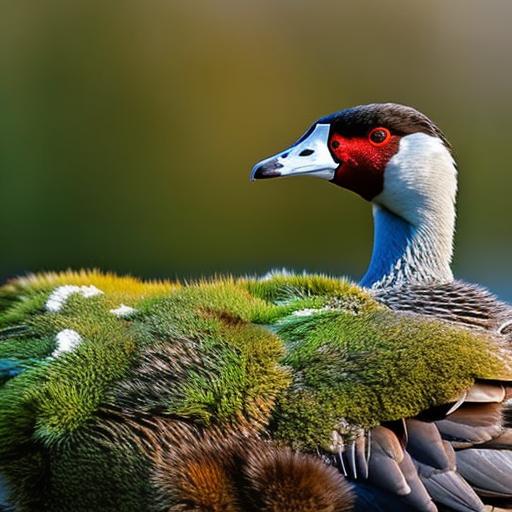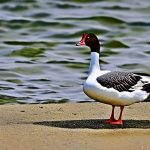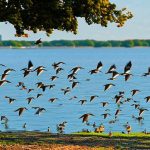Geese have been domesticated for thousands of years, with evidence of their domestication dating back to ancient Egypt and Rome. They were originally kept for their meat, feathers, and eggs, but over time they have also become popular as pets and for their ability to act as natural pest control. Keeping geese can be a rewarding experience, as they are intelligent, social animals that can form strong bonds with their owners.
There are several benefits to keeping geese. Firstly, they are excellent grazers and can help to keep your lawn or pasture trimmed. They also have a natural instinct to protect their territory and can act as effective guard animals, alerting you to any potential intruders. Additionally, geese are known for their strong maternal instincts and can make excellent foster parents for other poultry species.
Key Takeaways
- Keeping geese can be a rewarding experience for those who are willing to put in the effort.
- Before getting geese, it’s important to consider factors such as space, time, and resources.
- Indoor housing for geese should provide enough space, ventilation, and protection from predators.
- Outdoor housing for geese should include access to water, shade, and shelter from the elements.
- Fencing and enclosures for geese should be sturdy and secure to prevent escape and protect from predators.
Factors to Consider Before Keeping Geese
Before deciding to keep geese, there are several factors that you should consider. Firstly, geese require a significant amount of space. They need room to roam and graze, so it is important to have a large enough area for them to live comfortably. Additionally, geese require a lot of time and attention. They are social animals that thrive on interaction with their owners, so be prepared to spend time with them on a daily basis.
Another factor to consider is the noise level of geese. They are known for their loud honking, which can be disruptive in residential areas. If you live in a neighborhood with close neighbors, it is important to check local regulations regarding noise levels and whether or not keeping geese is allowed.
Indoor Housing for Geese
While geese are primarily outdoor animals, they still require some form of indoor housing for protection from the elements and predators. There are several types of indoor housing options available for geese, including sheds, barns, or even converted garages or outbuildings. The key is to provide enough space for the geese to move around comfortably and to have adequate ventilation to prevent the buildup of ammonia from their droppings.
Bedding and cleaning requirements are also important considerations when it comes to indoor housing for geese. Geese produce a significant amount of waste, so it is important to have a system in place for regular cleaning. Bedding materials such as straw or wood shavings can be used to absorb moisture and help keep the area clean.
Temperature and ventilation are also important considerations when it comes to indoor housing for geese. Geese are hardy birds that can tolerate a wide range of temperatures, but they should still be provided with shelter from extreme weather conditions. Adequate ventilation is also important to prevent the buildup of ammonia and ensure good air quality.
Outdoor Housing for Geese
Outdoor housing is essential for geese, as they require access to fresh air, sunlight, and the ability to graze. There are several types of outdoor housing options available for geese, including fenced-in areas, pens, or even free-range access to a larger area. The key is to provide enough space for the geese to move around comfortably and to have adequate protection from predators.
Protection from predators is an important consideration when it comes to outdoor housing for geese. Geese are vulnerable to predators such as foxes, raccoons, and coyotes, so it is important to have secure fencing or enclosures in place to keep them safe. Additionally, providing access to water and shade is important for the well-being of the geese.
Fencing and Enclosures for Geese
When it comes to fencing and enclosures for geese, there are several options available depending on your specific needs and budget. The type of fencing or enclosure you choose will depend on factors such as the size of your property, the number of geese you have, and the level of protection you require.
The height and strength of the fencing or enclosure is an important consideration when it comes to keeping geese. Geese are strong birds that can fly short distances and are capable of jumping over low fences. It is recommended to have a fence that is at least 4 feet high to prevent them from escaping. Additionally, the fence should be sturdy enough to withstand the weight of the geese and any potential predators.
Protection from digging predators is also important when it comes to fencing and enclosures for geese. Predators such as raccoons and foxes are known to dig under fences to gain access to poultry. To prevent this, it is recommended to bury the bottom of the fence at least 12 inches deep or use an apron of wire mesh that extends outwards from the base of the fence.
Feeding and Watering Geese

Geese have specific nutritional requirements that need to be met in order for them to thrive. They require a balanced diet that includes a combination of grains, greens, and protein. There are several types of feed available for geese, including commercial feeds, homemade mixes, or a combination of both.
When it comes to feeding geese, it is important to provide them with a consistent source of food. Geese should be fed at least twice a day, with access to fresh water at all times. Waterers should be large enough for the geese to submerge their heads in, as they need water for drinking as well as cleaning their feathers.
Nesting and Breeding Geese
If you are interested in breeding geese, it is important to provide them with suitable nesting conditions. Geese prefer to nest on the ground, so providing them with a secluded area with soft bedding material such as straw or hay is ideal. It is also important to provide them with privacy and protection from predators during the nesting and incubation period.
The incubation and hatching process for geese can take anywhere from 28 to 35 days. During this time, it is important to provide the nesting goose with a quiet and secure environment. Once the goslings hatch, they should be kept with their mother for at least the first few weeks to ensure proper bonding and care.
Health and Hygiene for Geese
Like any other animal, geese are susceptible to certain health issues that need to be monitored and addressed. Common health issues in geese include respiratory infections, parasites, and foot problems. It is important to have a veterinarian who is knowledgeable about geese and can provide regular check-ups and vaccinations.
Vaccinations and treatments are important for maintaining the health of your geese. Vaccinations can help prevent diseases such as avian influenza and Newcastle disease. Additionally, regular deworming and parasite control is important to prevent infestations.
Cleaning and disinfecting requirements are also important when it comes to maintaining the health and hygiene of your geese. Geese produce a significant amount of waste, so it is important to regularly clean their housing and remove any soiled bedding. Additionally, disinfecting the housing periodically can help prevent the spread of disease.
Geese in Urban and Rural Settings
Keeping geese in urban areas can have its benefits and challenges. In urban areas, geese can act as natural pest control by eating insects and weeds. They can also provide entertainment and companionship for their owners. However, noise levels can be a concern in residential areas, so it is important to check local regulations regarding noise levels and whether or not keeping geese is allowed.
In rural areas, keeping geese can be more practical due to the availability of space. Geese can help keep pastures trimmed and act as guard animals for other livestock. However, protection from predators is a greater concern in rural areas, so it is important to have secure fencing and enclosures in place.
Finding the Right Place to Keep Your Geese
In conclusion, keeping geese can be a rewarding experience, whether you are interested in them as pets or for production purposes. However, there are several factors to consider before deciding to keep geese, including space requirements, time commitment, noise levels, and local regulations. It is important to provide suitable indoor and outdoor housing for geese, as well as secure fencing and enclosures. Feeding and watering geese requires attention to their specific nutritional requirements. If you are interested in breeding geese, it is important to provide suitable nesting conditions and care for the goslings. Health and hygiene are important considerations when it comes to keeping geese, and regular check-ups and vaccinations are recommended. Whether you choose to keep geese in urban or rural areas, there are benefits and challenges to consider. Ultimately, finding the right place to keep your geese will depend on your specific needs and circumstances.
If you’re interested in learning about where to keep geese, you might also find this article on where to put a chicken coop helpful. It provides valuable insights on the ideal location for housing chickens and offers practical tips for creating a safe and comfortable environment for your feathered friends. Check it out here.
FAQs
What are geese?
Geese are waterfowl birds that belong to the family Anatidae. They are known for their long necks, webbed feet, and distinctive honking calls.
Where do geese live?
Geese can be found all over the world, in both wild and domesticated populations. They prefer to live near bodies of water, such as lakes, rivers, and ponds.
What do geese eat?
Geese are herbivores and primarily eat grasses, grains, and other vegetation. They may also eat insects and small aquatic animals.
Can geese be kept as pets?
Yes, geese can be kept as pets. However, they require a lot of space and care, and may not be suitable for everyone.
Where should geese be kept?
Geese should be kept in a secure outdoor area with access to water for swimming and drinking. They also need shelter from the elements and protection from predators.
What are some common predators of geese?
Common predators of geese include foxes, raccoons, coyotes, and birds of prey such as hawks and eagles.
Do geese migrate?
Yes, many species of geese migrate long distances each year to breed and feed. Some geese may travel thousands of miles each year.
Meet Walter, the feathered-friend fanatic of Florida! Nestled in the sunshine state, Walter struts through life with his feathered companions, clucking his way to happiness. With a coop that’s fancier than a five-star hotel, he’s the Don Juan of the chicken world. When he’s not teaching his hens to do the cha-cha, you’ll find him in a heated debate with his prized rooster, Sir Clucks-a-Lot. Walter’s poultry passion is no yolk; he’s the sunny-side-up guy you never knew you needed in your flock of friends!







